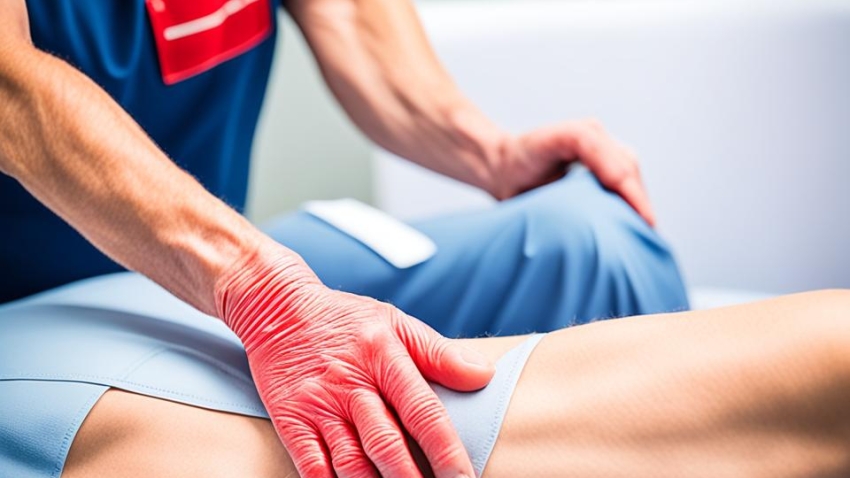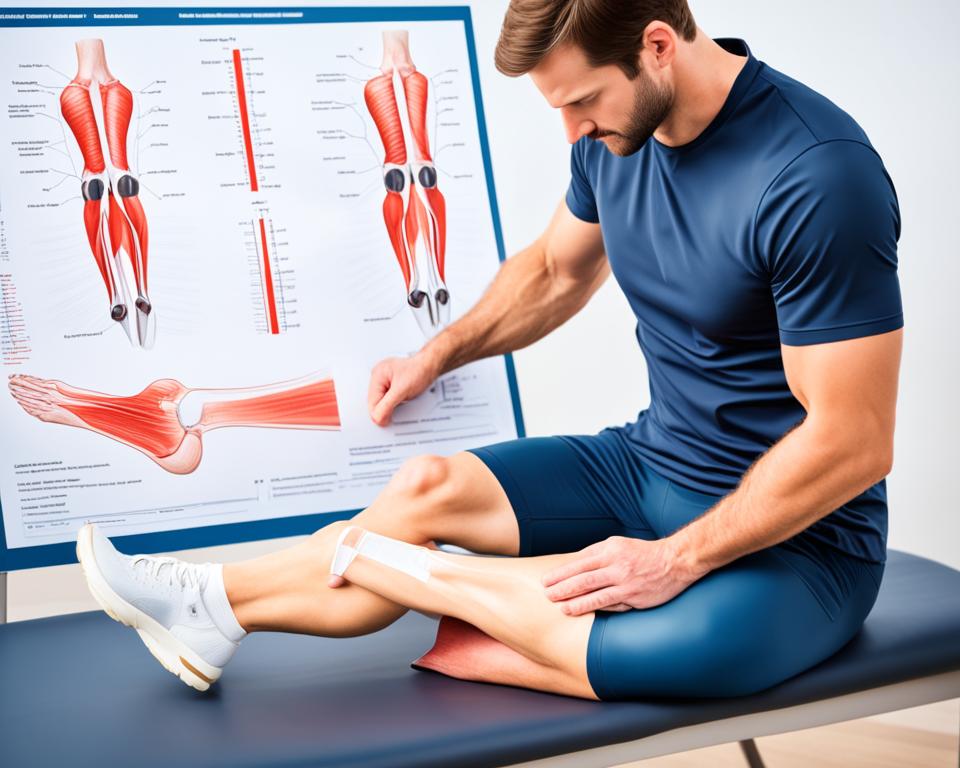
Congestive Heart Failure Leg Cramps – Causes and Relief
Congestive heart failure is a serious health condition. It makes it hard for the heart to pump blood well. This problem causes leg cramps, which are very frustrating. We will look into the main reasons for leg cramps in people with this issue. These include problems like fluid retention and edema. We will also talk about how electrolyte imbalances and venous insufficiency can lead to leg cramps.
We will share ways to help deal with these cramps. This includes diuretic therapy, adding extra potassium to your diet, changing your lifestyle, and using compression stockings. Knowing why leg cramps happen and doing things to reduce them can make a big difference. It helps people with congestive heart failure feel better and live a fuller life.
Read interesting things at : revolutionbookscamb
Key Takeaways
- Congestive heart failure can lead to frustrating leg cramps due to factors like fluid retention, edema, electrolyte imbalances, and venous insufficiency.
- Effective management strategies include diuretic therapy, potassium supplementation, lifestyle modifications, and the use of compression stockings.
- Understanding the underlying causes is crucial for developing an effective relief plan and improving the overall quality of life for individuals with congestive heart failure.
- Nocturnal leg cramps and muscle fatigue can be particularly problematic symptoms that require targeted interventions.
- Coping strategies and support resources can also play a role in managing the challenges of congestive heart failure and its associated leg cramps.
Understanding Congestive Heart Failure
Congestive heart failure is a serious and long-term issue. It happens when the heart can’t pump blood properly. This could be from the heart’s muscle being hurt, high blood pressure, or other heart problems. In congestive heart failure, the heart can’t pump enough blood for the body. This leads to fluid building up in the lungs and tissues.
What is Congestive Heart Failure?
Congestive heart failure is a health issue that occurs when the heart can’t fully pump blood. Different things can lead to this, like a weak heart muscle or high blood pressure. The heart finds it hard to supply the body with oxygen-rich blood. This causes several symptoms that affect daily life.
Common Symptoms of Congestive Heart Failure
The main signs of congestive heart failure are shortness of breath, feeling tired, and swelling in the legs and feet. These happen because the heart can’t pump blood well. Extra fluid in the body’s tissues is the result.
Leg Cramps: A Frustrating Symptom
Leg cramps are a common problem for people with congestive heart failure. They feel like painful muscle spasms in the calves, thighs, or feet. These cramps make it hard for people to move around and enjoy life. Many issues can cause leg cramps in these patients. It’s important to know the reasons to help manage and ease the cramps.
Congestive heart failure makes the heart work less effectively. This can cause various symptoms, including leg cramps. The cramps are especially bad at night, affecting sleep and causing discomfort. The condition also leads to muscle fatigue and weakness, making the cramps worse.
To manage leg cramps in these cases, it’s key to understand their causes. Issues like fluid retention, electrolyte imbalances, and venous insufficiency can trigger cramps. Health providers can help patients by tackling these problems. This approach can reduce the suffering from leg cramps and boost life quality.
Causes of Leg Cramps in Congestive Heart Failure
Leg cramps in congestive heart failure happen for a few reasons. This includes the body holding onto too much fluid, issues with electrolytes, and problems with the veins. It’s important to know what’s causing the cramps. This knowledge helps in managing the pain they bring.
Fluid Retention and Edema
When your body keeps too much fluid because of heart issues, your legs can get swollen. This swelling puts extra pressure on your muscles. The result can be really painful leg cramps.
Electrolyte Imbalance
Not having enough potassium or sodium can make your muscles act funny. This makes them cramp up without warning. It’s one more reason why cramps might happen if you have heart failure.
Venous Insufficiency
In heart failure, blood doesn’t flow well and not enough oxygen gets to your muscles. This makes your legs tired and weak. And when your muscles are stressed, they are more likely to cramp up.
Dealing with the causes can help those with heart failure handle leg cramps better. It’s all about being proactive in your care.
Congestive Heart Failure Leg Cramps
Leg cramps are a big issue, especially at night, for those with congestive heart failure. They’re called nocturnal leg cramps. These cramps not only hurt but also stop you from sleeping well. They happen more when your muscles are tired and weak, a common problem in heart failure. When we tackle these issues, we can help people sleep better and feel less pain.
Nocturnal Leg Cramps
At night, leg cramps are even harder to deal with for people with heart failure. The sudden muscle spasms can really mess up your sleep. This makes you even more tired and less able to do daily activities. It’s key to figure out what makes these nocturnal cramps happen. That way, we can find ways to make them less of a problem.
Muscle Fatigue and Weakness
Heart failure weakens your muscles, making leg cramps worse. Bad blood flow and not moving enough make your muscles weaker. Thus, you’re more likely to get cramps. This can make it harder to get around and enjoy life.
Managing Leg Cramps
Managing leg cramps in those with congestive heart failure involves two main steps. It includes using medicine and changing how you live. Diuretic therapy and adding extra potassium can help make cramps go away.
Diuretic Therapy
Diuretic medicines help the body get rid of extra fluids. They can lessen swelling and pressure that often lead to leg cramps. A doctor will decide how much diuretic is needed to keep the fluid levels right and stop the cramps.
Potassium Supplementation
Keeping the right balance of electrolytes, like potassium, is key to avoiding muscle cramps. People with heart failure might not have enough potassium. This could be from their treatment or the condition itself. Doctors check on these levels and can give supplements to fight cramps and keep muscles working well.
Combining diuretics to control fluid and adding potassium to balance electrolytes is a good strategy. It helps people with heart failure feel better. The teamwork between patients and their doctors is very important for success. This approach can greatly improve life quality.
Lifestyle Modifications for Leg Cramp Relief
Lifestyle changes can help a lot with leg cramps linked to heart problems. Adding simple but smart steps to daily life can stop leg cramps and keep them from coming back.
Exercise and Stretching
Doing easy workouts and stretching often can make your blood flow better. This reduces muscle tightness and eases leg cramps. Activities like walking, swimming, and gentle yoga are great for anyone with heart issues. A daily stretch for your calves, thighs, and feet cuts down on cramps.
Hydration and Dietary Changes
Drinking enough water and eating the right foods can help too. Staying hydrated stops cramps from getting worse. Eating more foods full of potassium, like bananas, greens, and avocados, also fights cramps by balancing salt in your body. Without much salty food, leg cramps can be less of a problem.
These changes really help those with heart problems. They address leg cramps right at the root, making life better.

Compression Stockings and Leg Elevation
Compression stockings and elevating legs can help with leg cramps linked to congestive heart failure. They boost circulation and cut down on fluid build-up in your limbs. This reduces cramping. Keeping your legs up above your heart level helps with venous return. It also eases edema and gives you relief from leg cramps.
These methods work well together with other treatments to fully manage this common issue.
| Intervention | How it Helps |
|---|---|
| Compression Stockings | They boost circulation and lower fluid buildup in the legs. This helps with leg cramps. |
| Leg Elevation | Raising the legs supports venous return and lessens edema. It offers relief from leg cramps. |
Using these simple steps along with other treatments can fully manage leg cramps for those with congestive heart failure.
Medications for Leg Cramp Relief
Healthcare providers might give you medicines to lessen leg cramps from congestive heart failure. These could be drugs like quinine or muscle relaxants. They might even suggest certain anti-seizure drugs. Over-the-counter choices, like creams, could also help. But, always talk to your doctor before trying any new treatments. This is to make sure they are safe for you.
| Medication Type | Mechanism of Action | Potential Benefits | Considerations |
|---|---|---|---|
| Quinine | Stabilizes muscle cell membranes, reducing muscle excitability and spasms | Effective in reducing the frequency and severity of leg cramps | Potential side effects, including cinchonism, and interactions with other medications |
| Muscle Relaxants | Inhibit the transmission of signals from the nervous system to the muscles, reducing muscle tension and spasms | Can provide relief for acute, severe leg cramps | May cause drowsiness and other central nervous system effects, requiring caution in individuals with congestive heart failure |
| Anti-seizure Drugs | Stabilize nerve and muscle cell membranes, reducing the excitability of neurons and muscle fibers | Effective in managing chronic, recurrent leg cramps | Potential side effects, such as dizziness, fatigue, and potential interactions with other medications used to manage congestive heart failure |
If you have congestive heart failure, it’s key to chat with your doctor about using any medications. Together, you will aim for the best mix of drugs and other treatments. This approach aims to give you the most complete relief from leg cramps.
When to Seek Medical Attention
Leg cramps can sometimes happen with congestive heart failure. But, if you have severe pain with them, or they last a long time, it’s serious. Medical attention is needed then. This could mean a problem from something else or that the heart failure is getting worse. Quick treatment is very important in these cases.
Don’t overlook intense or long-lasting leg cramps if you have congestive heart failure. Getting help early can find and treat any hidden issues. This helps improve life quality for those dealing with heart failure. Proactive care is key for managing this lifelong condition.

Coping Strategies for Leg Cramps
For leg cramps linked to congestive heart failure, medical help and lifestyle changes are key. But, folks can also use certain coping strategies to ease the discomfort. This approach helps in dealing with this symptom and boosts their quality of life.
Relaxation Techniques
Using relaxation techniques is a great way to lessen muscle tightness. It can also help with pain management for leg cramps. Activities like deep breathing, light stretching, and gentle massage help muscles calm down. This cuts down how often and how bad the cramps are.
Support Groups and Resources
Finding others dealing with congestive heart failure can bring huge comfort. Support groups and online or local resources offer support. They share tips and coping strategies for handling leg cramps and other signs.
Combining medical treatments, changes in life, and personal coping strategies works well. This applies to those with congestive heart failure facing the issue of leg cramps. This method lets sufferers improve their quality of life and deal better with the major challenges of their condition.
Prevention of Leg Cramps
People with heart issues might not stop leg cramps but can lower the chances. They should watch their fluid intake and keep electrolyte levels right. This helps fight off cramps.
Exercising is key. It makes blood flow better and muscles work well. Stretching and drinking lots of water each day also help. These habits can stop cramps from happening.
Changing your way of life can tackle the causes of leg cramps. This usually means managing fluids, keeping electrolytes in check, and staying active. A proactive approach can reduce cramp occurrences and boost life quality for heart patients.
| Preventive Strategies | Description |
|---|---|
| Fluid Management | Effective management of fluid balance to prevent edema and excess fluid buildup, which can contribute to leg cramps. |
| Electrolyte Balance | Maintaining proper levels of electrolytes, particularly potassium and sodium, to support muscle function and prevent cramping. |
| Regular Exercise | Incorporating gentle, low-impact physical activity to improve circulation and muscle strength, reducing the risk of leg cramps. |
| Hydration | Ensuring adequate hydration throughout the day to support muscle function and prevent dehydration-related cramps. |
| Lifestyle Modifications | Adopting a comprehensive approach that addresses the underlying causes of leg cramps, including fluid management, electrolyte balance, and physical activity. |
Conclusion
Leg cramps happen a lot and can be really frustrating for those with congestive heart failure. The causes can be many, from fluid retention to muscle fatigue. It’s key to know this to treat the cramps well.
Treatment involves both medical help like diuretics and lifestyle changes. This includes exercise and watching what you eat. These steps can help ease the pain of leg cramps. It’s also good to have coping strategies and get support for dealing with these symptoms.
By dealing with leg cramps ahead of time, people with congestive heart failure can have a better quality of life. A mix of medicine and changes in lifestyle can really help. It can even stop or lessen the bad effects that leg cramps have on those with heart problems.










Leave a Reply